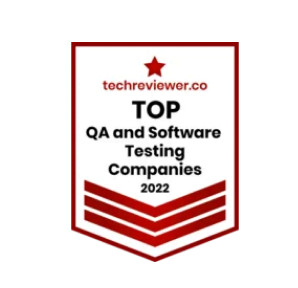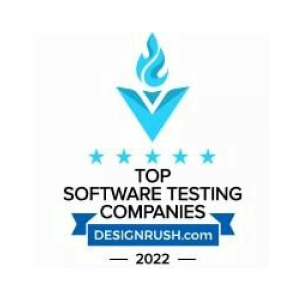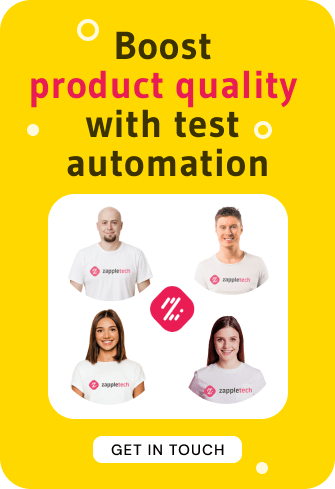Hire QA Engineers


Why Hire External QA Engineers?
Benefits of Hiring External QA Engineers
Why Outsourcing QA Is the Best Solution?
Wide Range of QA Services
Industries We Work With
What Our Customers Say
The Best Solutions From an Experienced QA Engineers
Our Expertise

How to Build a Partnership With Us?
Hiring QA Engineers at Zappletech
Start Cooperation Now!

Why Should You Choose to Hire QA Engineers?
In software development, Quality Assurance (QA) engineers play a pivotal role in ensuring applications’ reliability, functionality, and usability. Their meticulous scrutiny and testing procedures are the bedrock of delivering high-quality software products that meet user expectations and industry standards. QA engineers are the gatekeepers who prevent defects and bugs from seeping into the final product, safeguarding the reputation and credibility of the development team and the organization.
Significance of Hiring QA Engineers
The success of any software project hinges greatly on the proficiency and competence of the QA engineers involved. Hiring the right QA engineers is not merely about filling positions; it’s about assembling a team of skilled professionals who can effectively collaborate, innovate, and adapt in dynamic development environments. The repercussions of hiring subpar QA talent can be severe, leading to delayed releases, costly rework, and compromised user experiences. Conversely, hiring top-tier QA engineers empowers organizations to streamline their development processes, mitigate risks, and deliver superior software products that resonate with end-users.
Understanding the Role of QA Engineers
QA engineers, often called quality assurance analysts or testers, are integral members of software development teams responsible for ensuring the quality, reliability, and performance of software applications. Their primary role revolves around meticulously testing software products to identify defects, bugs, and inconsistencies that may impede functionality or user experience. QA engineers collaborate closely with developers, product managers, and other stakeholders throughout the development lifecycle to define testing strategies, create test plans, execute test cases, and report on test results. Beyond detecting issues, they also critically analyze root causes, troubleshoot problems, and recommend corrective actions to enhance product quality. In essence, QA engineers act as the guardians of software quality, striving to uphold the highest standards of excellence in every deliverable.
Key Skills and Qualities to Look for
When seeking to hire QA engineers, it’s imperative to prioritize candidates who possess a diverse skill set and a combination of technical expertise, analytical acumen, and interpersonal abilities. Some key skills and qualities to consider include:
- Technical Proficiency: QA engineers should be proficient in various testing methodologies, tools, and frameworks, including manual testing, automated testing, regression testing, performance testing, and usability testing. They should have a solid understanding of programming languages, scripting languages, and testing frameworks commonly used in software development, such as Selenium, JUnit, TestNG, or Cucumber.
- Attention to Detail: QA engineers must be able to meticulously review requirements, specifications, and test cases to identify potential issues and ensure comprehensive test coverage. They must also have a keen eye for detail and be adept at spotting even the most subtle defects in software applications.
- Problem-Solving Skills: QA engineers encounter complex challenges and unexpected issues regularly, requiring strong problem-solving skills to analyze root causes, troubleshoot problems, and devise effective solutions. They should be resourceful, creative, and proactive in addressing issues that arise during testing.
- Communication Skills: Effective communication is paramount for QA engineers to collaborate with cross-functional teams, articulate testing strategies, report on test results, and provide feedback to developers and stakeholders. They should be able to communicate concisely and diplomatically in verbal and written formats.
- Collaborative Spirit: QA engineers work closely with developers, product managers, designers, and other team members to achieve common goals and deliver high-quality software products. They should be team players who can collaborate effectively, share knowledge, and contribute positively to the team dynamic.
By prioritizing candidates who embody these skills and qualities, organizations can ensure they hire QA engineers who are well-equipped to excel in their roles and drive continuous improvement in software quality assurance processes.
Assessing Your QA Needs
Before embarking on the journey to hire QA engineers, it’s essential to gain a comprehensive understanding of the project’s scope, objectives, and technical requirements. This involves thorough discussions with project stakeholders, including developers, product managers, and end-users, to elucidate the key functionalities, performance benchmarks, and user experience expectations. By clarifying the project requirements upfront, organizations can establish a solid foundation for defining the scope of QA activities and identifying the specific testing needs that must be addressed throughout the development lifecycle.
Determining QA Team Composition
Once the project requirements have been delineated, the next step is to determine the optimal composition of the QA team based on the project’s complexity, scale, and nature. This entails assessing the breadth and depth of testing expertise required to effectively validate all aspects of the software application, from functional correctness and performance scalability to security robustness and compatibility across platforms and devices. Depending on the project’s requirements, the QA team composition may include a mix of manual testers, automation engineers, performance testers, security testers, and domain-specific specialists, each contributing their unique expertise to the testing effort.
Estimating Workload and Timeline
After defining the QA team composition, organizations must estimate the workload and timeline associated with the QA activities to ensure adequate resource allocation and project planning. This involves analyzing the scope of testing tasks, defining test scenarios and cases, estimating the effort required for test execution and defect resolution, and aligning the QA timeline with the overall project schedule. By accurately estimating the QA workload and timeline, organizations can proactively identify potential bottlenecks, allocate resources effectively, and mitigate the risk of schedule delays or budget overruns during the software development lifecycle.
By systematically assessing their QA needs across these dimensions—project requirements, team composition, workload, and timeline—organizations can lay a solid groundwork for hiring QA engineers with the requisite skills, experience, and capabilities to effectively fulfill the project’s demands. This proactive approach enhances the efficiency and effectiveness of the QA process and contributes to the overall success and quality of the software product being developed.
Crafting an Effective Job Description
Crafting a compelling job description begins with clearly articulating the responsibilities and expectations of the QA engineer role. This entails providing a detailed overview of the key tasks, duties, and deliverables for which the successful candidate will be responsible throughout the software development lifecycle. This may include developing and executing test plans, identifying and documenting defects, collaborating with cross-functional teams to troubleshoot issues, and ensuring adherence to quality standards and best practices. By clarifying the role’s scope and expectations, organizations can attract candidates with the necessary skills and experience to thrive in the position.
Outlining Technical Skills and Experience Required
In addition to clarifying job responsibilities, outlining the technical skills and experience required for the QA engineer role is essential. This involves specifying the proficiency level in various testing methodologies, tools, and technologies relevant to the organization’s software development stack. Whether it’s proficiency in manual testing techniques, expertise in test automation frameworks such as Selenium or Appium, or familiarity with specific programming languages like Java, Python, or JavaScript, detailing the technical requirements ensures that candidates understand the qualifications needed to succeed in the role. Moreover, organizations may also highlight preferred certifications or qualifications, such as ISTQB certification, to further refine the candidate pool and ensure alignment with industry standards.
Emphasizing Soft Skills and Team Dynamics
In addition to technical proficiency, successful QA engineers possess a range of soft skills and interpersonal qualities that are crucial for effective collaboration and teamwork. Therefore, job descriptions should also emphasize the importance of soft skills and team dynamics in the QA engineer role. This may include strong communication skills, attention to detail, problem-solving abilities, adaptability, and a collaborative mindset. By emphasizing these soft skills, organizations signal their commitment to fostering a positive team culture and promoting effective communication and collaboration among team members. Additionally, highlighting opportunities for professional growth, mentorship, and career advancement can further attract motivated candidates to develop their skills and contribute to the organization’s success.
By crafting an effective job description that clarifies job responsibilities, outlines technical skills, and emphasizes soft skills and team dynamics, organizations can attract qualified candidates who are well-aligned with the requirements of the QA engineer role. This proactive approach not only streamlines the hiring of QA engineers but also sets the stage for building a high-performing QA team that drives quality and innovation in software development initiatives.
Making the Right Hiring Decision
After thorough screening and interviewing processes, the next step in hiring QA engineers is to analyze candidate performance and feedback to make an informed decision. This involves evaluating each candidate’s technical skills, problem-solving abilities, communication proficiency, and cultural fit based on feedback from interviewers, technical assessments, and reference checks. It’s essential to assess how well candidates demonstrate their understanding of QA principles, approach to testing methodologies, and ability to collaborate effectively with cross-functional teams. Additionally, soliciting feedback from all stakeholders involved in the hiring process provides valuable insights into each candidate’s strengths, weaknesses, and overall suitability for the role.
Considering Long-Term Growth and Development Potential
In addition to assessing immediate qualifications and capabilities, organizations should also consider candidates’ long-term growth and development potential when making hiring decisions. This involves evaluating candidates’ willingness and ability to learn, adapt, and grow within the organization. Look for candidates who demonstrate a proactive attitude towards professional development, a passion for continuous learning, and a track record of acquiring new skills and knowledge. Assessing candidates’ alignment with the organization’s values, culture, and long-term strategic objectives. This can help ensure that the chosen candidate is not only a good fit for the current role but also has the potential to evolve and contribute to the organization’s success in the future.
Finalizing Job Offer and Onboarding Process
Once a hiring decision has been made, the final step is to extend a job offer and facilitate the onboarding process to welcome the new QA engineer into the organization. This involves finalizing the details of the job offer, including compensation, benefits, start date, and any other pertinent terms and conditions. Clear and timely communication throughout the offer negotiation process is crucial to ensuring a positive candidate experience and securing acceptance of the offer. Additionally, organizations should prepare a comprehensive onboarding plan to familiarize the new hire with the organization’s culture, policies, procedures, tools, and team dynamics. Providing adequate support, guidance, and mentorship during onboarding helps integrate the new QA engineer seamlessly into the team and sets them up for success in their role.
By carefully analyzing candidate performance and feedback, considering long-term growth and development potential, and finalizing the job offer and onboarding process, organizations can make the right hiring decision and set their new QA engineers up for success. This proactive approach not only ensures candidates’ alignment with the organization’s needs and values but also fosters a positive and productive work environment conducive to professional growth and excellence in software quality assurance.
Onboarding and Integration
Effective onboarding is critical for newly hired QA engineers to acclimate quickly to their roles and responsibilities within the organization. Providing comprehensive training and orientation programs ensures that hired engineers understand the organization’s culture, values, policies, and procedures from the outset. This may include introductory sessions on the company’s history, mission, and vision and practical training on internal tools, testing frameworks, and development processes. Tailoring the onboarding experience to each QA engineer’s specific needs and experience level helps set clear expectations and facilitates a smooth transition into their new role. Additionally, assigning a mentor or buddy to provide guidance, support, and feedback during onboarding can enhance the learning experience and foster a sense of belonging and camaraderie among new hires.
Integrating QA Engineers into Project Teams
Integration into project teams is a crucial aspect of the onboarding process for QA engineers. Seamless integration ensures that new hires feel valued, engaged, and empowered to contribute meaningfully to project objectives from day one. Organizations can facilitate integration by introducing new QA engineers to key stakeholders, including developers, product managers, designers, and fellow QA team members. Encouraging collaboration and knowledge sharing within project teams helps bridge gaps in domain expertise, aligns expectations, and fosters a culture of cross-functional teamwork. Moreover, involving QA engineers in project planning sessions, sprint ceremonies, and daily stand-ups enables them to gain firsthand insights into project dynamics, priorities, and timelines, facilitating their active participation and contribution to project success.
Establishing Communication Channels and Reporting Structures
Effective communication is essential for successful collaboration and coordination within project teams, particularly in distributed or remote work environments. Establishing clear communication channels and reporting structures ensures that hired QA engineers can access the information, resources, and support needed to fulfill their roles effectively. This may include setting up dedicated communication channels for project-specific discussions, updates, and queries, such as Slack or Microsoft Teams groups. Additionally, defining reporting structures for test results, defect tracking, and project status updates helps streamline communication and ensure transparency and accountability across the QA team and project stakeholders. Regular check-ins, feedback sessions, and retrospective meetings provide opportunities to address issues or concerns and improve communication practices and team dynamics.
Organizations can facilitate the seamless onboarding and integration of new hires by providing comprehensive training and orientation, integrating QA engineers into project teams, and establishing effective communication channels and reporting structures. This proactive approach accelerates the ramp-up time for new QA engineers and fosters a collaborative and supportive work environment conducive to productivity, innovation, and success in software quality assurance.
In conclusion, hiring QA engineers represents a fundamental investment in the success and longevity of software development endeavors. Beyond merely filling positions, it’s about cultivating an organization’s culture of quality, innovation, and collaboration. By carefully assessing project needs and defining clear job descriptions, organizations can attract candidates who possess the technical expertise required and align with the company’s values and long-term goals.
Furthermore, conducting thorough screening processes and incorporating feedback from all stakeholders ensures that the chosen candidates are competent and well-suited for the dynamic challenges of the role. Once hired, providing comprehensive onboarding programs and facilitating seamless integration into project teams are essential to fostering a supportive and productive work environment.
Moreover, establishing robust communication channels and reporting structures promotes transparency, accountability, and continuous improvement within QA teams. By investing time and resources in recruiting and integrating top-tier QA talent, organizations not only mitigate risks and streamline development processes but also lay the groundwork for innovation and excellence in software quality assurance.
In essence, hiring QA engineers is not just a transactional process; it’s a strategic imperative that can ultimately determine the success or failure of software development projects. Through thoughtful planning, diligent execution, and ongoing support, organizations can harness the full potential of their QA teams to deliver superior software products that meet and exceed customer expectations.
Frequently Asked Questions:
Who is a QA Engineer?
A QA Engineer is a specialist who is dedicated to improving the development process of digital solutions by detecting and preventing the reoccurrence of defects. Their functions go far beyond direct product testing and include:
- control of the compliance of the software product with the initial
- requirements;
- assessment of possible risks;
- recommendations for eliminating defects;
- writing test scenarios;
- software testing;
- analysis of test results.
Because of this variety of tasks, the concept of a QA engineer includes the roles of a tester, quality control engineer, and quality assurance specialist.
Why should companies hire third-party QA engineers?
Companies can resort to QA outsourcing if they do not have an in-house team or their in-house specialists do not have a sufficient level of skills required for specific tasks. This hiring model is also convenient for working on large-scale projects or testing that needs to be done quickly.
What to look for when choosing a QA engineer?
QA outsourcing service providers usually provide clients with the opportunity to participate in the selection of dedicated professionals. When selecting a candidate, it is important to pay attention to their hard skills, work experience, and personal qualities:
- ability to perform various types of testing;
- knowledge of SQL basics and ability to work with databases to participate in backend testing;
- ability to work with the GIT version control system;
- understanding of the basics of OS, mobile, and web programs;
- experience in project management systems (Jira etc.), knowledge bases (e.g., Confluence), and test management systems;
- understanding of client-server architecture principles;
- knowledge of the basics of different software development methodologies;
- high level of self-organization;
- ability to work in a team.
How much do the services of a QA specialist cost?
he cost of a QA engineer’s services depends on their level. A Junior specialist earns, on average, about $800 per month, the work of a Middle tester is valued at $1,000, and a Senior specialist at $1,500. If a Team Lead is brought in to work on your project, they will have to be paid up to $3,500 per month.
Another factor that affects the cost of QA services is the country of residence of the QA engineer. For example, a specialist from Ukraine earns, on average, $1,000 per month, while the same work performed by a tester from the USA will be priced at $7,000.
What is more profitable: outsourcing the entire project or taking a dedicated tester on your team?
There is no way to say that one of these hiring models is more advantageous than the other. The choice between outsourcing, a dedicated team, or expanding your staff should be based on your particular company’s needs. If you don’t have an in-house QA team, outsource the project entirely. If you do not have enough specialists or they do not have enough skills to work with the right tech stack, hire dedicated specialists and control the project yourself.
What guarantee of quality do I get by contacting you?
The cooperation between Zapple Tech and our clients is official; before starting work, we conclude a contract, the terms of which are discussed individually with each customer. In addition, if you are not satisfied with the quality of work of the allocated specialist, we are obliged to replace them as soon as possible. It is worth noting that in our practice, there have been no such cases.
Why automate testing?
Test automation saves you time and budget. Some types of testing involve the constant repetition of certain actions, which is time-consuming and requires significant financial expenses. Automating such tasks speeds up tests from a few days to a few hours, thereby enabling a faster product release.
How to hire QA engineers, and what is the best option?
If you need QA engineers, you can choose from three options:
- Hire specialists on staff. This option is the most convenient because your team will be available 24/7. At the same time, you should be prepared for additional costs for office rent, salaries, and employee training.
- Turn to the services of freelancers. This hiring model is the most economical, but no one can guarantee the quality of the work performed because your relationship with a freelancer is not legally formalized.
- Find employees through an outsourcing service provider. The best option is to outsource the project or employ dedicated specialists in your team. This is cheaper than hiring a QA engineer on staff, and you can be sure of the quality of the final product.
How can I hire QA engineers at Zapple Tech?
To contact the manager of our company, you can fill out the feedback form on the website, send a request by e-mail or schedule a call with our CEO. Discuss the project details, decide on the cooperation model, and sign the contract at the first meeting. Afterward, we will select specialists for your project with whom you can get acquainted and communicate within a few days.
What QA engineers do you have on your team?
Zapple Tech employs more than 30 full-time AQA engineers, 60% of whom have reached the Senior level in their careers.
What companies do you work with?
The Zapple Tech team works with large, established companies that want to continue to develop and with startups that want to take their business to the next level. As for industry expertise, we have worked with companies specializing in e-commerce, finance, health care, and tourism. Whatever your business is connected to, feel free to contact us; we will find a tailor-made solution for you.








